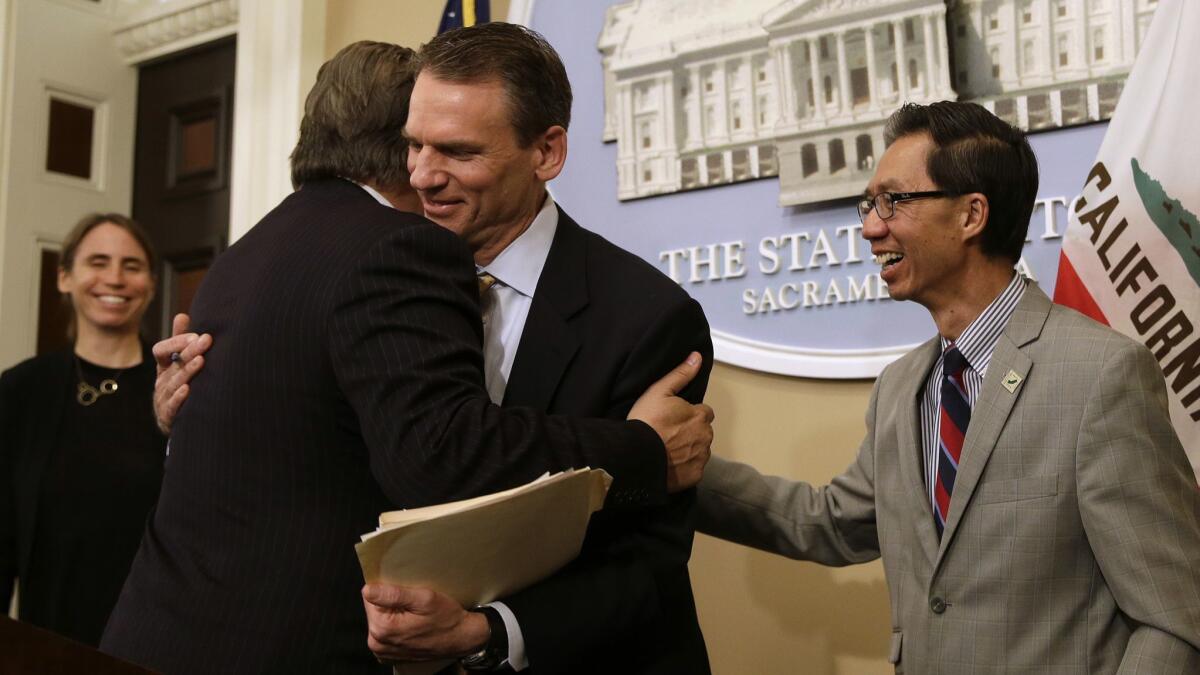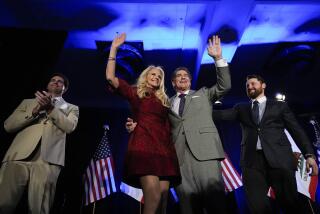Capitol Journal: The November election just got a lot less confusing for California voters

Californians won’t vote on the nation’s toughest privacy protections after all — because the Legislature did its job and handled the matter.
That’s one less confusing ballot proposition and hundreds fewer annoying TV ads that voters will be pestered with in November.
Same with a complex local tax measure.
The soft drink industry was scared of local governments slapping taxes on sugary soda. So soda makers qualified a ballot initiative making it harder to increase local taxes period. But they withdrew the measure last week after the Legislature passed a bill to ban new soda taxes for 12 years.
There also won’t be a squirrely ballot measure sponsored by paint manufacturers asking taxpayers to subsidize their lead paint cleanup. Outraged legislators responded to the initiative by introducing bills to penalize the companies. In the end, everyone holstered their weapons and agreed to negotiate.
Those three initiatives were pulled off the ballot on the last day possible because of a reform that was passed four years ago, but largely ignored. This year the reform finally was used as intended.
Under the system, the Legislature and an initiative sponsor can negotiate a compromise. If the two sides work out a deal, the measure can be pulled off the ballot even after it has qualified with enough voter signatures.
The idea is that public policy is usually best decided by elected representatives holding public hearings with rigorous debate, aided by staff expertise. Of course, that’s the textbook, idealistic notion. There’ll always be mushroom bills — they grow in the dark.
This new reform is actually very old. Called an “indirect initiative,” it was pioneered more than a century ago by California’s original reformer, Gov. Hiram Johnson. He championed citizen democracy to counter the special interests — mainly railroads — that dominated Sacramento. The initiative, referendum and recall were his babies.
The indirect initiative was never used, mainly because back then we had a part-time Legislature and few initiatives. Foolishly, it was scuttled in the mid-’60s during a misguided constitutional revision.
It was resurrected in 2014, one of several major reforms adopted in recent years by voters and the Legislature in an attempt to make the state more governable. The result has been a lot less gridlock.
Step by step we’ve installed these reforms:
— Budget passage: The legislative vote requirement was lowered from two-thirds to a simple majority. That has made budgeting much easier for Gov. Jerry Brown.
— Gerrymandering: Honest redistricting of congressional and legislative seats was mandated. The chore was stripped from the Legislature and handed to an nonpartisan citizens’ commission.
— Open primaries: Every voter has the same ballot and can choose any candidate, regardless of party. This tends to force candidates to moderate their views and appeal to the center. At least that’s the theory.
— Time in office: Term limits have been loosened, offering lawmakers more years in one house — so they don’t immediately look for their next gig after being sworn in.
— Transparency: Starting with this legislative session, bills must be in print 72 hours before a final vote. This is herbicide for mushroom bills.
“The secret to reforming is understanding incrementalism,” state Sen. Bob Hertzberg (D-Van Nuys), a former Assembly speaker, once told me. Incrementalism works. It’s not as scary to people as volcanic reform.
Hertzberg and two other legislators, Assemblyman Ed Chau (D-Arcadia) and state Sen. Bill Dodd (D-Napa), teamed with real estate developer Alastair Mactaggart to negotiate a deal on the consumer privacy initiative.
Mactaggart got riled up about privacy after chatting with a Google engineer at a cocktail party. The engineer candidly told him, “If people only knew how much we know about them, they’d really freak out.”
So Mactaggart created a ballot initiative and spent $3 million-plus gathering signatures. But he was facing a tough, $100-million fall opposition campaign from the likes of Google, AT&T and other tech giants. He was open to legislative compromise.
Coverage of California politics »
Chau is a former IBM engineer who learned enough about misuse of personal data that it scared him.
“It’s like they’re setting a camera over you,” he told me.
Dodd, who owned some Culligan water franchises, once had his ID stolen.
“It was an absolute nightmare for 16 months,” he said. That made him a crusader for consumer protection.
Hertzberg is a buzz saw, constantly on the move to get something done. “A force of nature,” Mactaggart called him.
The four settled on a bill similar to the initiative.
“If you came from Mars, it’s the difference between a Ford F-150 and a Chevy Silverado,” Mactaggart said. And it was patterned after a recently enacted European law.
Starting in 2020, consumers can find out what personal information a business has about them and prevent it from being sold. They also can order it deleted. And if the companies don’t comply, they can be sued.
Unlike the initiative, the bill can later be easily tweaked by the Legislature to fix flaws.
“Never in my wildest dreams did I think the Legislature would produce something as good as this,” a thrilled Mactaggart told me. “It’s the most far-reaching privacy legislation ever passed in this country.”
The bill passed without a “no” vote in either house and was immediately signed by Brown.
But for proposition lovers, there’ll still be 12 to fight over in November, including whether to extend daylight saving time all year and kill the gas tax increase.
Follow @LATimesSkelton on Twitter
More to Read
Get the L.A. Times Politics newsletter
Deeply reported insights into legislation, politics and policy from Sacramento, Washington and beyond. In your inbox three times per week.
You may occasionally receive promotional content from the Los Angeles Times.







